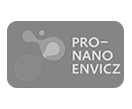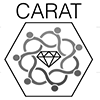Effects of Macromolecular Crowding on Enzyme Structure and Kinetics
The cellular environment contains large amounts of macromolecules. None of them is present in high concentration, but overall, the environment is crowded, because macromolecules occupy about 40 % of the volume of the cells. Proteins are frequently studied in aqueous solutions without the presence of other macromolecules both in vitro and in silico. However, including these crowding agents is required for a realistic description, because they influence the overall stability of proteins, preference of more compact conformations, enzyme kinetics, etc. We will focus on three enzymes: yeast alcohol dehydrogenase and glutamate dehydrogenase, whose activities are influenced by crowding, and citrate synthase because of its two conformations. By means of molecular simulations, we will study these enzymes in aqueous solutions of dextran, polyethylene glycol, and other crowding agents. The results of the study and their critical comparison with experimental data will provide a deeper understanding of the effects of crowding agents on the structure, stability, and activity of these enzymes.
Mgr. Ing. Krupičková Pluhařová Eva Ph.D.
 jh-inst.cas.cz
jh-inst.cas.cz
















